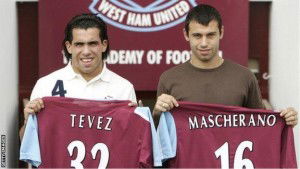 West Ham joint-chairman David Sullivan denies West Ham have done anything wrong in the transfer dealings of Enner Valencia
West Ham joint-chairman David Sullivan denies West Ham have done anything wrong in the transfer dealings of Enner Valencia
Sullivan said: “Valencia’s economic rights were wholly owned by Pachuca when we bought him. Sam is wrong. But he didn’t know much about the actual transfer deal other than wanting the player.We have not broken any rules on third party ownership.”
Allardyce was caught in a sting with a fictitious businessmen in London along with his agent, Mark Curtis, and his financial adviser, Shane Moloney. During the meeting with Telegraph under cover reporters he said Enner Valencia had been under a third-party ownership agreement when he signed the Ecuador forward for £12m for West Ham from Mexican club Pachuca in 2014, but that the third-party ownership ended on the transfer and the Hammers acquired the player “whole”.
 Third-party ownership of players is whereby private investors, it can be an individual, company, or fund, own part of a player’s economic rights.It first came to attention in the UK in 2006 with the transfer of two Argentines, Carlos Tevez and Javier Mascherano from Brazil to the Hammers.The economic rights of the two players were part-owned by a London fund, in a set up that was widespread in some European countries and South America at the time.
Third-party ownership of players is whereby private investors, it can be an individual, company, or fund, own part of a player’s economic rights.It first came to attention in the UK in 2006 with the transfer of two Argentines, Carlos Tevez and Javier Mascherano from Brazil to the Hammers.The economic rights of the two players were part-owned by a London fund, in a set up that was widespread in some European countries and South America at the time.
Then, such a set-up was not illegal in England, but there were important caveats that the investor could not attempt to influence club playing and selection decisions, or transfers, or indeed any other major club policy. However, it later transpired that a clause in the Tevez deal said that the third-party investor could move the player on to another club, and could decide the fee involved.
That broke Premier League rules, as it clearly “materially influenced” club policy. West Ham admitted it was in breach of the rules, and was fined £5.5m for this and for hiding the details of the deal from the league. Because of the fallout from this case, and the issues it raised, the Football Association banned TPO at the beginning of the 2008-09 season.
FIFA took the decision in December 2014 to also ban TPO, with the changes brought in during a transitional period in early 2015.
About Sean Whetstone